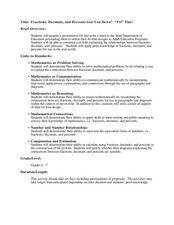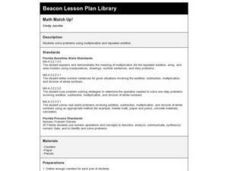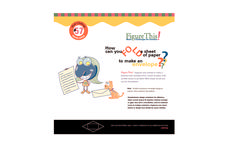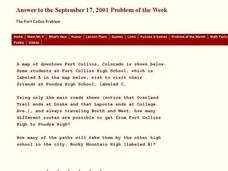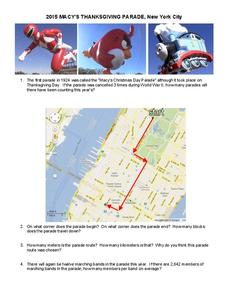Curated OER
Sunshine Math- 1 Venus, XIII
In this math applications worksheet, students complete 7 varied questions that include: adding money, counting, estimation, symmetry and reasoning.
Curated OER
Fractions, Decimals, and Percents Got You Down? "Tri" This!
Have your class design their own mathematical study aids. Learners collaborate in groups on the design of tri-fold presentation describing the relationships between mathematical computations. Then, they write a business letter to the...
Curated OER
This is Jeopardy
Being able to estimate, understanding place value and fractions, and solving word problems are all important skills in math. This PowerPoint is a Jeopardy-style game where young mathematicians utilize all of these skills in order to win...
Scholastic
Study Jams! Least Common Multiple
RJ instructs your sixth graders in two different methods of determining least common multiples. The first is by listing several multiples of each number, and the second is by drawing factor trees. This is an ideal flipped classroom...
Curated OER
Math Match Up!
Help learners solve problems using multiplication and repeated addition. Using counters, learners will be paired up to solve problems. They will go through a series of questions and show models with the counters for the solution. Then...
Curated OER
Read a Map
In this word problem worksheet, 5th graders use a coordinate grid as a map to answer 6 problems. They work with ordered pairs, locate quadrants, and apply the information to find items in the zoo.
Curated OER
Working With Scientific Notation
In this scientific notation worksheet, students read about the discovery of new planets. They use scientific notation to identify the number of miles from one planet to the next. Students determine how long it would take to travel, when...
Curated OER
Justifying Answers
Young scholars study story problems and learn how to find and justify their answers. They will use a story problem and then respond to the prompt questions from the teacher. They must add and subtract facts to 6 and learn how to justify...
Curated OER
Percents: What's the Use?
Learners explore percentages in real world situations. In this percents lesson, students determine the final sales price after discounts. Learners interview community members and determine how percentages are used in the real world.
Curated OER
Math Challenges
Students participate in a series of challenging math lessons designed to engage their critical thinking skills. In these real-world problem solving lessons, student solve symmetry and repeated pattern problems, make lists/tables to...
Curated OER
Word Problem
In this algebra worksheet, students solve word problems using equations to solve real world problems. There is one problem with an answer key.
Curated OER
The Fort Collins Problem
In this algebra worksheet, students solve word problems using algebra to solve real world problems. There is one question that has an answer key.
Curated OER
Word Problems That Involve the Mean (II)
In this word problem learning exercise, learners examine real world problems. They compute the mean, median, and mode of given problems. This one-page learning exercise contains 5 multi-step problems. Answers are provided.
EngageNY
Piecewise and Step Functions in Context
Looking for an application for step functions? This activity uses real data to examine piecewise step functions. Groups create a list of data from varying scenarios and create a model to use to make recommendations to increase revenue.
Math Can Take You Places
Picture This
Engage scholars in a ratio lesson that employs real-world scenarios. Learners will compare the length and width of pictures and use a table to identify ratio patterns. They watch "Math Can Take You Places" and discuss jobs that use math...
Curated OER
Matrix Operations
Two real-world activities to practice adding, subtracting and multiplying matrices to problem solve. Data from several Pro football quarterbacks is used in one activity to make some predictions based on their stats. Then the class takes...
Curated OER
Matrix Analysis of Networks
Explore the connection between a finite graph, a directed graph, and a matrix. Graph lines and identify the relationship of matrices in real-world scenarios. Then use this information to work with a partner to plan and design a town...
Curated OER
Addition Word Problems 1, Version 1
In this addition worksheet, students solve word problems containing one and two digit numbers. Students complete 5 addition word problems.
Mrs. Burke's Math Page
The Amazing Pi Race
Add a sense of excitement to your math class with this race across the country. Using their knowledge of all things circular, young mathematicians work in pairs answering a series of pi-related word problems as they hop from one city to...
Yummy Math
2015 Macy's Thanksgiving Parade
Take a seat on the parade route with a holiday-themed set of word problems. Young mathematicians answer questions based on the annual Macy's Thanksgiving Parade in New York City, including finding the average number of members in a...
EngageNY
End-of-Module Assessment Task: Pre-Calculus Module 4
Challenge your scholars to show what they know about the Law of Sines, Law of Cosines, and inverses. The six-question assessment is the last in a series of 16. Pupils find the area of triangles and show that the Law of Sines and Law of...
Scholastic
Study Jams! Rate
Zoe is reading books over vacation and wants to know at her current rate, how many will she finish by the end. Building on prior knowledge of fractions and ratios, young mathematicians learn how equivalent rates are used to answer her...
Flipped Math
Calculus AB/BC - Interpreting the Derivative in Context
Put math in a real-life context to increase connections to the concept. Pupils view a short video that first reviews the connection between derivatives and rates of change. They learn how to interpret the derivative in contextual...
Radford University
Exploring Types of Variation Activity
Create a variable list of problems. Groups come up with four scenarios. Each situation represents different types of variation, direct, inverse, joint, and combined. Teams then generate questions about their contextual problems for...



